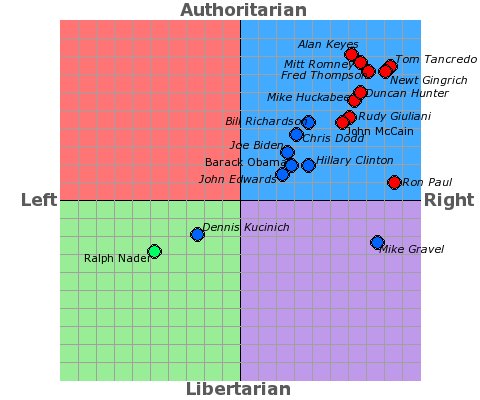I agree. Especially when you look at Judaism and Islam, they are political prescriptions for how to live as well as religious ones. We do also have to remember, however, that Judaism, Christianity, Islam, and virtually any religion can be a part of other political ideologies as well. A lot of Islamism as an ideology is modern in the sense that it explicitly poses itself as an alternative to other modern ideologies like Capitalism, Socialism, and Liberalism.Jive, the thing you have to understand about these religions is that, to their adherents (particularly the fundamentalist ones), there is no difference between the law and the religion. The law is the religion. When a religion states that people absolutely have to live by certain tenants, and punish them in specific ways for not doing so, you're always going to have the issue of politicization of religion. The judeo-christian religions are by their very nature political. The only way for them not to be is to purposefully disregard certain aspects of their dogma.
I basically agree with what you're saying. My point is more "don't be suspicious of every Muslim" than "it's a magical religion with no problems." If anyone follows any religious text literally...well, that's just really badSo...are you trying to say that the media intentionally paints Islam in a negative light, which makes it look worse than it really is? While that may be true to some degree (My moneys on Fox), but for those that only tune in for the facts, it tells no different story. I think the major point is, that the Koran like the Bible, can be inspiration for violent acts and therefore is inherently dangerous in the hands of credulous people. And if you have ever read parts of the Koran, it is not a stretch at all to say that anyone who believes and follows its text will be violent. I'm not sure what part we are confused about...have you even read a part of the Koran (http://www.thereligionofpeace.com/Quran/023-violence.htm)? To suggest that following its text would not result in violence is absurd. And I don't think anyone said that Islam was the only violent religion (I'm curious, where in Buddhist texts does it support violence?), but I think if you look at the lot, Islam would be the worst.
From the site: "This is what makes the verses of violence so dangerous. They are given the weight of divine command. While Muslim terrorists take them as literally as anything else in the Qur'an, and understand that Islam is incomplete without Jihad, others do little to contradict them. Indeed, what do they have? Speaking of peace and love may win over the ignorant, but when every twelfth verse of Islam's holiest book either speaks to Allah's hatred for non-Muslims or calls for their death, forced conversion, or subjugation, it's little wonder that sympathy for terrorism runs as deeply as it does in the broader community - even if most Muslims personally prefer not to interpret their religion in this way.
In fact, many Muslims are simply unaware of the Qur'an's near absence of verses that preach universal non-violence. This is because their understanding of Islam comes from what they are taught by others. In the West, it is typical for Muslims to come to believe that their religion must be like Christianity - preaching the New Testament virtues of peace, love, and tolerance - because Muslims are taught that Islam is supposed to be superior in every way. They are somewhat surprised and embarrassed to learn that the evidence of the Qur'an and the bloody history of Islam are very much in contradiction to this."
My argument was not so much that there are naturally violent inclinations in Buddhist texts, but that there are violent Buddhist incidences, as there are for virtually all religions. The point is, it can sometimes be the religion's fault, and at other times it's something else that's to blame.
For more on Buddhism and violence, click:
here
or here!
or maybe here!
don't forget about here!
Aw heck, why not even here!
 (Not really about violence, but it is funny!)
(Not really about violence, but it is funny!)...I apologize if I'm not responding to all of your statements, but you're about five steps ahead of me intellectually and it's difficult to keep up


 ...
... ), I'd really like to thank you for engaging my ideas so thoroughly and thoughtfully. Usually when I try to get my thoughts out on religion, people just overlook me or flame the snot out of me ("LOL the gayest thing I've ever read"), so it's been nice to have someone to talk to about this who doesn't just write me off
), I'd really like to thank you for engaging my ideas so thoroughly and thoughtfully. Usually when I try to get my thoughts out on religion, people just overlook me or flame the snot out of me ("LOL the gayest thing I've ever read"), so it's been nice to have someone to talk to about this who doesn't just write me off 